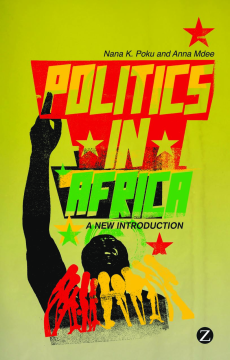
Additional Information
Book Details
Abstract
Democracy, prosperity and self-rule, this was the vision of African independence. Across the continent, however, the 'optimism' that characterized the immediate post-independence period has largely faded. Meanwhile, ordinary Africans lurch between undemocratic, unaccountable and unresponsive governments and a decaying traditional African past.
How did things go so wrong? Why has the continent lagged behind others in economic development despite its potential natural resources? Why are so many African states prone to conflict? And why has democracy been slow to take root in a majority of the countries? Covering everything from African economies to the role of the state, rural livelihoods to issues of gender, 'Politics in Africa' offers a fresh perspective in answering these questions, making the continent's problems more understandable, less wretched and even intensely hopeful.
Up-to-date, concise and provocative, this is indispensable reading for anyone interested in African politics.
Nana K. Poku is Executive Director and Professor of Health Economics at HEARD.
Anna Mdee is a research associate at the Overseas Development Institute (ODI).
'A lucid introduction to the political dilemmas facing contemporary Africa.'
Patrick Chabal, King's College London
'There is a surprising amount packed into the pages of this short book. Weighing colonial legacies in the scale against post-colonial exigencies, the authors manage to serve up an account that is fresh, provocative and eminently readable. It provides an excellent starting point for anyone in search of a better understanding of contemporary Africa.'
Paul Nugent, University of Edinburgh
'A superb introduction to some of the most critical political challenges facing Africa today. It offers a clear and coherent discussion of the complexities of, and linkages between, Africa's past and present. An excellent addition to our understanding of African society.'
Pascoal Mocumbi, former Prime Minister of Mozambique
'I highly recommend this book as an insightful and well referenced commentary on key issues in our modern African society, and its colonial and post-Independence history. It will be of great value to Africans and non-Africans alike, with an interest in how politics shapes our lives.'
Kenneth Kaunda, former President of Zambia
'Deserves a prominent place on reading lists in politics, development studies, modern history and interdisciplinary African studies, where it will provide a lucid and challenging introduction to some central debates.'
Justin Pearce, International Affairs Journal
Table of Contents
| Section Title | Page | Action | Price |
|---|---|---|---|
| Front cover | Front cover | ||
| About the authors | i | ||
| Title Page | iii | ||
| Copyright | iv | ||
| Contents | v | ||
| Figures and tables | vi | ||
| Abbreviations | vii | ||
| Acknowledgements | viii | ||
| Introduction | 1 | ||
| Structure of the book | 5 | ||
| 1 Colonialism, racism and African resistance | 6 | ||
| The scramble for Africa | 6 | ||
| The colonial impress | 12 | ||
| table 1.1 Variations in colonial systems | 14 | ||
| The colonial economies | 19 | ||
| Inheritance at independence | 21 | ||
| State of Africa | 24 | ||
| Conclusion | 27 | ||
| 2 Instabilities, adjustment and renewal | 29 | ||
| Africa’s economic decline | 30 | ||
| table 2.1 Foreign direct investment, 1997–2010 | 31 | ||
| table 2.2 Selected macroeconomic indicators, sub-Saharan Africa and South Asia, 1963–80 | 32 | ||
| The colonial legacy | 39 | ||
| Political legacies | 42 | ||
| table 2.3 Deaths from conflict, 1963–2008 | 44 | ||
| table 2.4 Conflict to post-conflict environments – key features | 48 | ||
| Conclusion | 50 | ||
| 3 Food-insecure and vulnerable: the politics of African rural livelihoods | 51 | ||
| The state of agriculture in sub-Saharan Africa | 54 | ||
| table 3.1 Development of sub-Saharan African agriculture | 55 | ||
| External factors and global food prices | 56 | ||
| figure 3.1 Increase in food prices 2006–08 | 57 | ||
| figure 3.2 Agricultural spending by selected African countries in 2008: percentage of total government expenditure | 58 | ||
| figure 3.3 Share of ODA for agriculture | 60 | ||
| Who owns the land? | 62 | ||
| figure 3.4 Rural workload by gender | 63 | ||
| Securing inputs for agriculture | 66 | ||
| A new vision for agriculture in Africa | 70 | ||
| Conclusion | 76 | ||
| 4 Big men and little women: the politics of gender in Africa | 78 | ||
| The international discourse of gender | 80 | ||
| Development discourses and women’s livelihoods | 84 | ||
| Women, microfinance and entrepreneurship | 89 | ||
| The power to be heard: representation and voice | 91 | ||
| The power of stereotypes | 96 | ||
| Conclusion | 97 | ||
| 5 More than HIV/AIDS: the politics of health in Africa | 99 | ||
| Introduction | 99 | ||
| HIV/AIDS – the politics of poverty, sex and aid | 100 | ||
| Sociocultural and economic factors | 106 | ||
| In this battle, the enemy is cunning and the armoury is sparse | 110 | ||
| table 5.1 AIDS commitments by source, 1999–2008 | 111 | ||
| figure 5.1 Number of annual AIDS-related deaths in Africa | 112 | ||
| table 5.2 Close and distant determinants of HIV infection and possible prevention responses | 113 | ||
| Health systems – inadequate and failing | 116 | ||
| Conclusion | 120 | ||
| Conclusion: an African renaissance | 121 | ||
| Bibliography | 129 | ||
| Index | 144 | ||
| About Zed Books | 152 | ||
| Back cover | Back cover |
